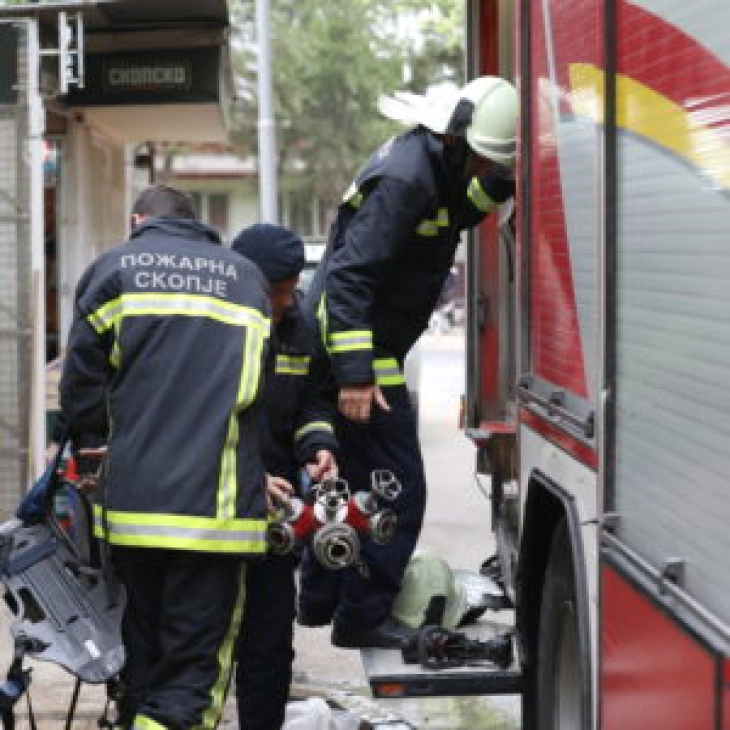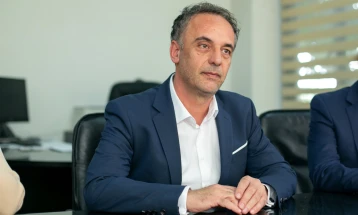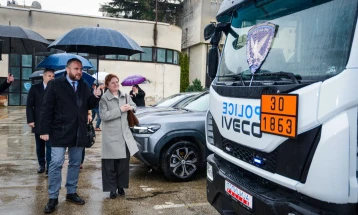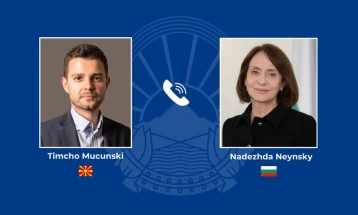Are legal amendments and changes to the fire protection model necessary?

Skopje, 9 August 2021 (MIA) - The wildfires in Kochani, Staro Nagorichane, the Maleshevo Region, Gevgelija and Skopje shed light onto the systemic weaknesses and the lack of investments in firefighting services over the past 30 years. There are problems with the implementation of the Law on Firefighting as well, and the large-scale fires that affected this country have raised the question of whether it’s necessary to amend the law to make its practical application more effective, as well as dedicating more attention to forming volunteer firefighting squads like in some neighboring countries.
Even though the law requires a minimum number of firefighters in relation to citizens, the cities in which this is the case are rare. In most cities, the number of firefighters is much lower in comparison to citizens who live there. The law is also not being applied in the part where it says that smaller towns without firefighting services should pay a certain financial compensation for firefighting interventions.
Kochani Mayor Nikolcho Ilijev told MIA that this is a long-term problem that they’ve been facing as a local self-government.
“We’ve tried to find an adequate solution, but we lack support and understanding from the neighboring municipalities. We’ve offered inter-municipal cooperation agreements where it’s precisely regulated by law that in order to get a municipal service, there should be an inter-municipal agreement. Unfortunately, they didn’t sign them,” Ilijev says, appealing to the neighboring municipalities Zrnovci and Cheshinovo-Obleshevo to consider reassigning some funds to the needs of the firefighting service.
Research done by the Center for Civil Communications has shown that the country is lacking over 500 firefighters. In most places, the number of firefighters is under the legally determined minimum, and the municipalities that meet the minimum requirement say they wouldn’t mind more employees.
The Law on Firefighting stipulates the exact minimum number of firefighters in relation to the number of citizens, but in reality, things are different. The Territorial Firefighting Unit of Skopje is missing around 200 firefighters to satisfy the legal minimum. Kochani, which has been hit by unprecedented wildfire, only has 17 firefighters, which is almost half of the legally determined minimum, given that this unit also serves Zrnovce and Cheshinovo-Obleshevo.
It’s similar in Kumanovo, where there are around 50 firefighters intervening not only in Kumanovo, but in the neighboring municipality Lipkovo as well.
“We’re covering urban and rural areas. We’re well-equipped, but we don’t fulfil the legal minimum. We often have to intervene in urban areas, so it’d be good if we had a hydraulic scale. Kumanovo is the biggest municipality in the country, and we need this. It takes more firefighters to intervene in an open space. We’re happy with the rest of the equipment, such as the pumps and uniforms,” Dejan Ilievski, commander of the Kumanovo TFFU says.
The situation is the same in most firefighting services throughout the country, who have been raising awareness about further equipping staff, renewing the vehicle fleet and securing modern firefighting gear.
There are nine firefighters in Staro Nagorichane, which is in accordance with the legal minimum, but the big fires that affected this region showed that the legally determined number of firefighters may not have been enough, given the size and configuration of the area they’re covering.
“It would be good if we had more firefighters. The surface area of the municipality is large, and it’s primarily mountainous,” Dalibor Trajkovski, commander of the Firefighting Brigade of Staro Nagorichane says.
The large-scale fires that affected this country raised the question of possibly considering more engagement by authorized institutions in order to form volunteer firefighting squads, which would give the government a larger number of trained individuals to put out large-scale fires.
“Some neighboring countries have solved this issue. Maybe we should follow their example and make legal amendments in order to create a long-term, quality solution that will respond to today’s challenges. I’m talking about volunteer firefighting squads that exist in the neighboring countries, such as Slovenia. These are volunteer firefighting squads, the people are trained and they intervene when there’s a need for it, and they get compensated for it. According to the number of citizens, we’d need 31 firefighters, but for fires like these we’d need around 100. We couldn’t employ that many people, but we could amend the law and form volunteer firefighting squads with young, trained staff, and it’d be easier to deal with these situations,” the Mayor of Kochani says.
The Law on Firefighting allows for such squads to be formed on a municipal level, but there are very few of them. Sveti Nikole, Bitola, Ohrid, and the Skopje municipalities Chair and Ilinden have volunteer firefighting squads.
“Due to organized participation of citizens in the protection from fires and other disasters, in accordance with the law and other regulations, volunteer firefighting squads can be formed, which represent part of the only fire protection systems,” the Law says.
Vladimir Simonovski, commander of the Territorial Firefighting Unit of Skopje, says that the problem with the lack of staff in firefighting services should be handled first, which means to employ the legally mandated number of firefighters per citizens.
“We’re lacking 200 firefighters in Skopje, Bitola and Tetovo are also lacking firefighters. It’s rare for any city, especially for the smaller ones, to meet the legal minimum. We have to handle the legal portion first. The volunteer firefighting squads are a system that takes time to build,” Simonovski tells MIA.
He adds that volunteer squads can be formed with a decision by the Council and when the Protection and Rescue Directorate is notified of it.
Funds for firefighters secured through other means as well
Alongside the municipal budgets, funds for firefighters are secured through block donations from the Ministry of Defense’s budget. They inform that the funds for firefighting have increased 21% in relation to 2019.
“The block donations from the Ministry of Defense’s budget were given in 2019 for the first time, amounting to MKD 331,755,000. The funds increased 21% to 400,000,000 in 2021,” the Ministry of Defense says in a response sent MIA.
12% are set aside from fire insurance premiums from insuring property against fire damage, and these funds go into a separate account owned by the Protection and Rescue Directory in order to purchase firefighting equipment, and for the needs for firefighting airplanes that are currently grounded due to a failed tender.
The Law on Firefighting says that 2% should be set aside from premiums of hull insurance of motor vehicles, insurance from responsibility of using motor vehicles, as well as a percentage from fines charged for offences in the area of fire and explosion protection.
Average age of firefighting vehicles is 28 years, Valandovo and Strumica have vehicles dating back to 1966
The Center for Civil Communications did a research that showed striking data about the conditions in firefighting services. According to data, the average age of firefighting vehicles is 28 years, and the average age of the vehicle fleet in Kratovo and Delchevo is 35 years. There are models dating back to 1966 in Valandovo and Strumica.
The purchase of new firefighting vehicles and equipment is slow. The renewal of the vehicle fleet or equipment is done through donations, even though the firefighting services raise awareness every day that they need new, modern equipment to function normally.
Firefighting is an expert activity with humanitarian qualities, serving the public interest. The Law on Firefighting states that it’s a field whose long-lasting and uninterrupted working is secured by the state and municipalities. It remains to be seen how much the new situation with the fires will raise alarm with the authorities.
Biljana Anastasova-Kostikj
Aleksandra Maksimovska
Toni Ajtovski
Translated by Dragana Knezhevikj







